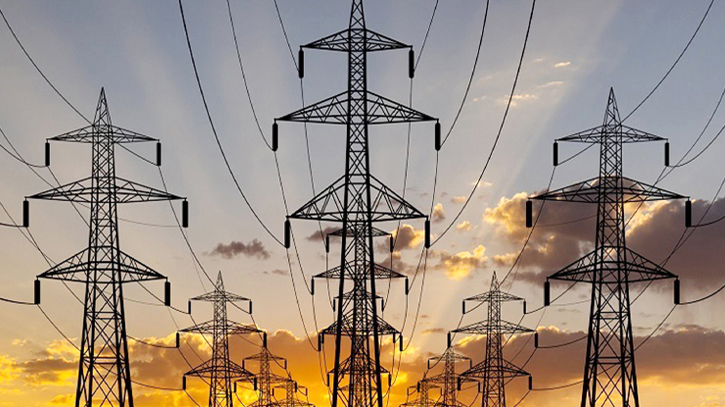
Photo: Collected
A severe power crisis has unfolded across the country due to acute coal shortages, significantly impacting several key coal-based power projects. The nation's power sector, already under immense strain, is on the verge of widespread load shedding as it grapples with worsening financial, logistical, and operational challenges.
As of September 12, the Power Development Board (PDB) has reported troubling figures for major coal-based power projects.
The Matarbari Power Plant, with a capacity of 1,200 megawatts (MW), is currently generating only 900 MW. The Rampal Power Plant, which can produce 1,320 MW, is running at a slightly reduced capacity of 1,234 MW. The SS Power Plant, also with a capacity of 1,320 MW, is delivering just 612 MW. Meanwhile, the Adani Power Plant, with a 1,600 MW capacity, is providing 1,010 MW but has recently reduced its output by 600 MW due to unpaid bills, exacerbating the crisis.
The situation is particularly alarming for the 1,320 MW Banskhali Power Plant, which is on the verge of closure due to an acute coal shortage. The PDB has warned that if this new and significant power plant were to shut down, the country's power situation could deteriorate rapidly, potentially leading to a full-blown energy crisis.
The root of this complication lies with Islami Bank Bangladesh Plc, which has withheld funds for eight Letters of Credit (LCs) opened with a 100 percent margin. As a result, three ships loaded with coal are currently stranded at outer anchorage, unable to transfer their cargo to lighter vessels due to the halted coal unloading process.
This standoff has led to rapidly dwindling coal reserves at the Banskhali plant, which requires 12,000 metric tons of coal daily to operate at full capacity. As of September 12, only 60,000 metric tons of coal remain in reserve, enough for just five more days of operation.
Rezaul Karim, Chairman of the Power Development Board, acknowledged the seriousness of the situation. He stated, “If the production of that center is stopped due to any reason, the load shedding will increase further. We have advised them to open an LC in another bank to meet the demand.”
Officials have reported that coal exporters have halted the discharge of coal from the three ships docked at Chattogram port due to outstanding bills. The Indonesian supplier has made repeated requests to Islami Bank through the beneficiary bank, but to no avail. The supplier has even threatened to cease business with Bangladesh if the situation is not resolved promptly.
Adding to the urgency, the Matarbari coal power plant, another critical component of Bangladesh’s power infrastructure, has faced its own set of challenges. In July, the High Court halted coal imports to the Matarbari plant for six months due to corruption allegations. As of now, one operational unit of the plant generates between 650 and 700 MW of electricity daily, with a maximum output of 602 MW on recent days. However, this unit requires approximately 6,500 to 7,000 tons of coal each day. With a current stockpile of about 280,000 tons, the plant can sustain operations for another month to a month and a half.
Muhammad Saifur Rahman, Chief Engineer of Coal Power Generation Company Bangladesh Ltd (CPGCBL), explained the predicament, stating, “As a case is ongoing in the High Court regarding the tender, our coal imports are temporarily halted. The last shipment arrived last month. With the existing coal reserves, we can operate one unit for about a month.” He expressed hope that the legal issue would be resolved soon but could not provide a specific timeline.
The Matarbari coal power plant had placed an order for 2,205,000 tons of coal through Japan's Sumitomo Corporation. According to the contract, the last delivery was made in mid-August. The plant was supposed to secure new coal supplies through tendering before Sumitomo's contract expired, but this process has been delayed.
The 1,200 MW Matarbari project, costing Tk 20,854 crore, was built on 1,414 acres in Cox's Bazar. The plant began operations with one 600 MW unit in July 2023 and is expected to commission another unit in December. However, with financial constraints and a lack of funds, similar threats loom over other plants like Rampal and Payra, both of which are also facing coal shortages and outstanding dues to importers.
Despite these challenges, Bangladesh has made significant strides in its power and energy sector over the past 15 years. The government has embarked on ambitious projects, including the Ruppoor Nuclear Power Plant, the Rampal power plant employing Ultra Super Critical technology, and the introduction of a floating LNG terminal.
However, the recent fall of the Awami League government has sparked allegations of corruption, particularly concerning the cost and construction of these mega power projects.
As Bangladesh grapples with these power shortages, the resilience and efficiency of its power sector will be tested. The country’s ability to navigate these financial and logistical hurdles will be crucial in ensuring that it can meet the growing demands of its population and sustain its economic development.
Messenger/Disha








